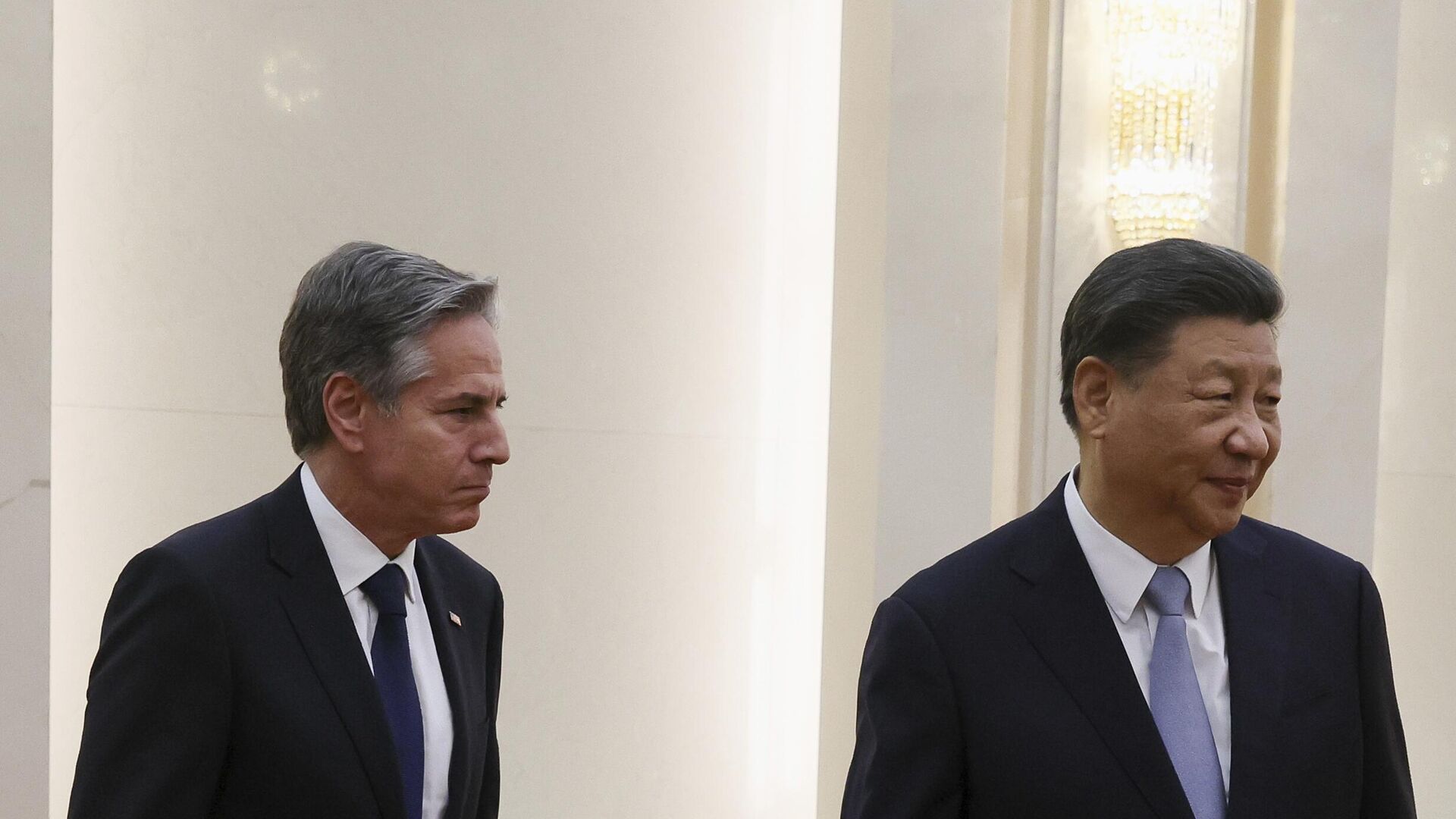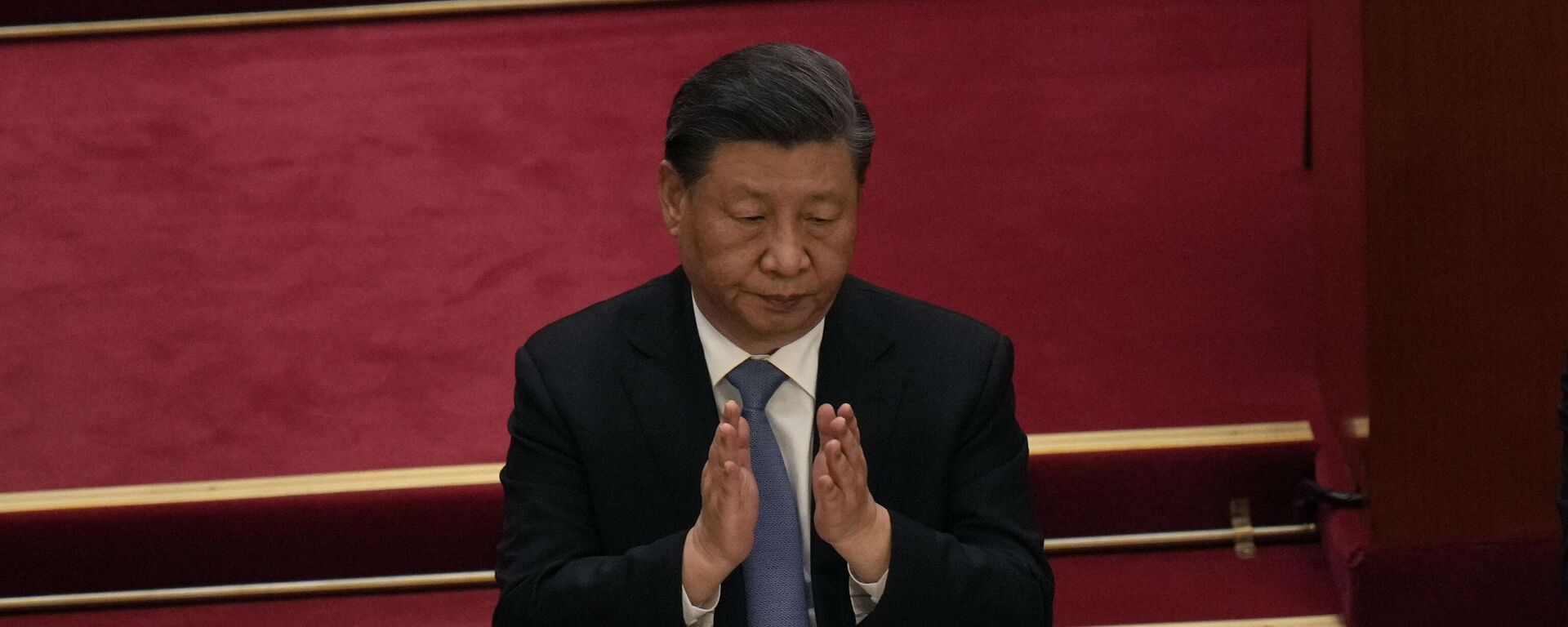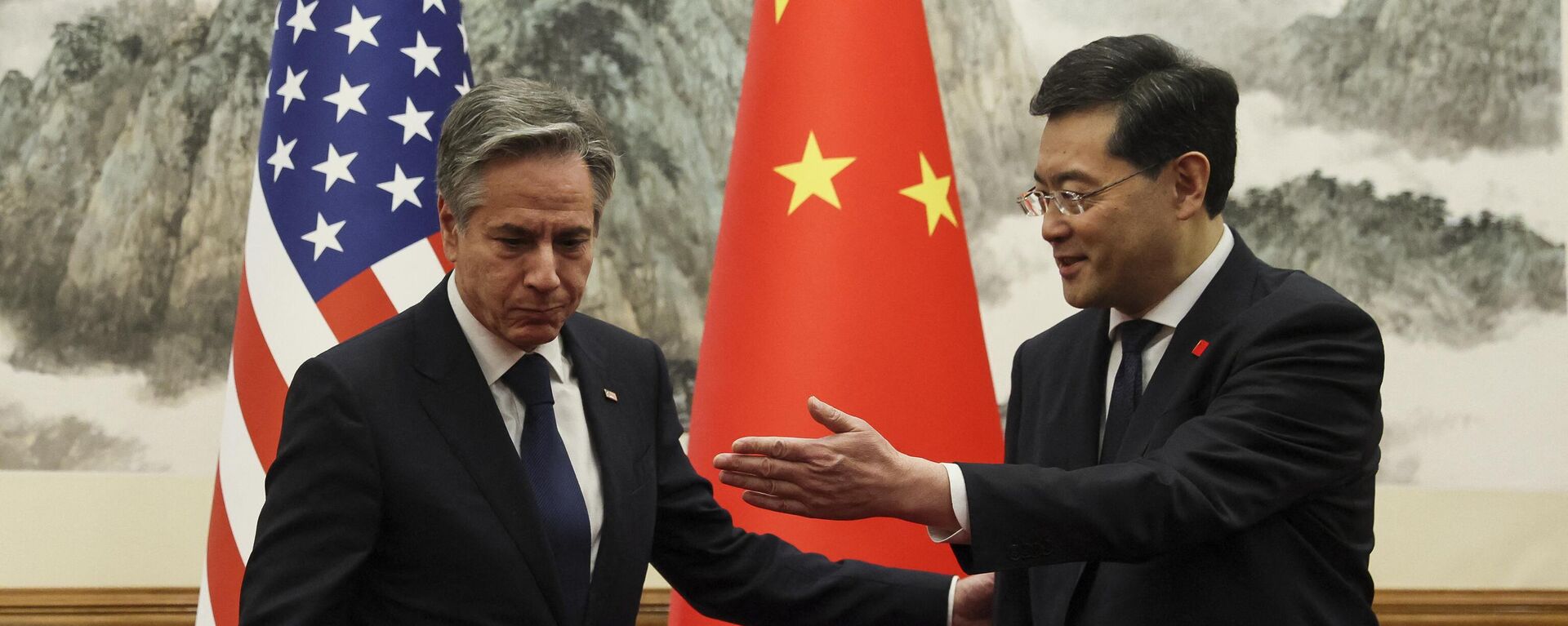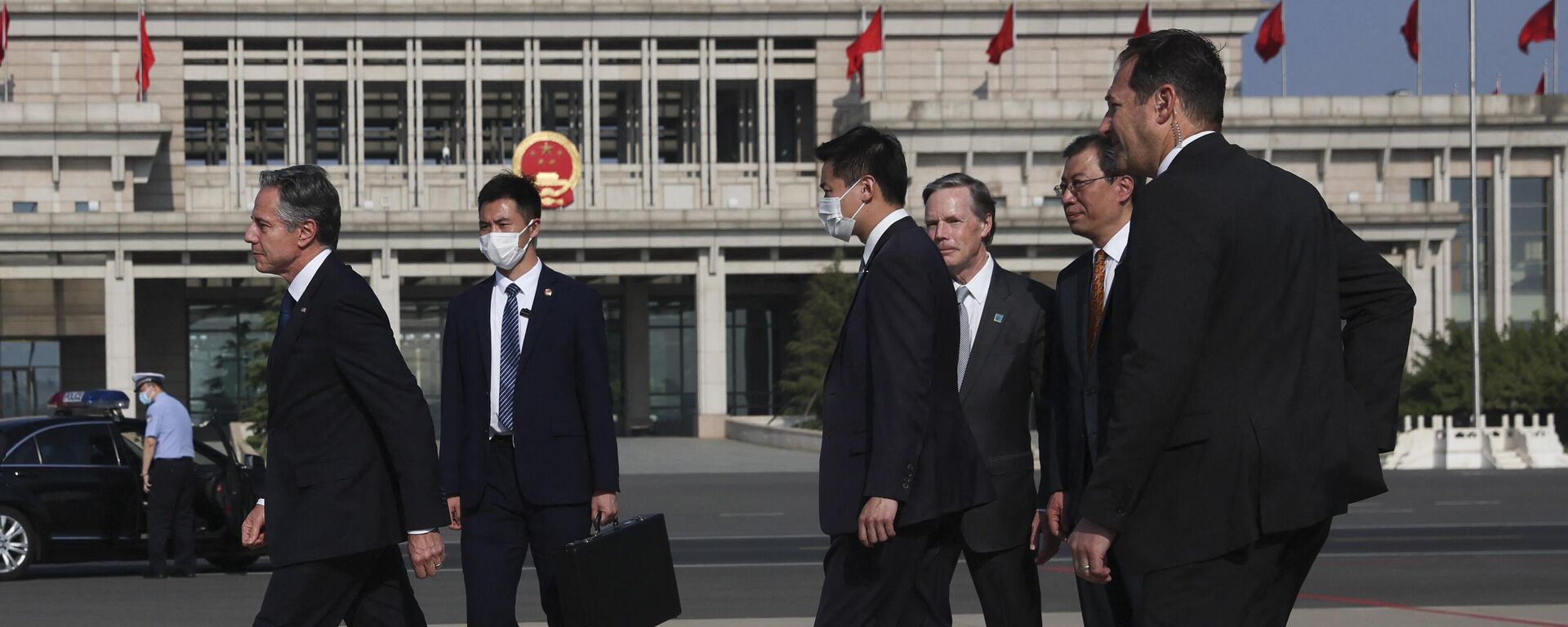https://sputnikglobe.com/20230619/limited-progress-from-xi-blinken-talks-but-core-us-china-issues-likely-beyond-compromise-1111300783.html
'Limited Progress' From Xi-Blinken Talks, But Core US-China Issues Likely Beyond Compromise
'Limited Progress' From Xi-Blinken Talks, But Core US-China Issues Likely Beyond Compromise
Sputnik International
Over the weekend, US Secretary of State Antony Blinken made a long-awaited trip to Beijing to meet with senior Chinese diplomats, including President Xi Jinping, in an attempt to stabilize the US-China relationship.
2023-06-19T16:08+0000
2023-06-19T16:08+0000
2023-06-19T16:08+0000
analysis
antony blinken
china
xi jinping
us-china relations
global stability
competition
taiwan
https://cdn1.img.sputnikglobe.com/img/07e7/06/13/1111301073_0:84:2471:1474_1920x0_80_0_0_dbbef7a080e91a83762282b162518043.jpg
Over the weekend, US Secretary of State Antony Blinken made a long-awaited trip to Beijing to meet with senior Chinese diplomats, including President Xi Jinping, in an attempt to stabilize the US-China relationship. While the two sides renewed their pledges not to seek the other’s overthrow or marginalization, few of the key issues at stake in their competition have been adequately addressed, an international affairs expert said.Alan Cafruny, a professor of international affairs at Hamilton College in New York, told Sputnik on Monday that those issues “are almost certainly not susceptible to negotiations or compromise. However, improved communication may serve to de-escalate provocative and dangerous words and actions, perhaps most notably with respect to US rhetoric with respect to the ‘One China’ policy.”“There was some limited progress with respect to air travel, student exchanges (more than 300,000 Chinese students are studying in the USA), and the willingness to improve communications. However, China will refuse to re-start military-to-military communication as long as Washington continues to sanction its defense minister. More generally, there is no evidence of progress with respect to Taiwan or the US broader containment strategy in which Europe and Japan are being enlisted. At the same time, anti-China sentiments are increasing on a bilateral basis in the context of 2024 elections,” Cafruny said.Cafruny explained that while the US once welcomed China’s integration into the global capitalist economy, as the socialist state began to enjoy increasing economic success, Washington became more ambivalent, with a shift beginning years before the Trump administration made explicit its strategic shift toward “great power competition” with Moscow and Beijing in 2018.He told Sputnik there were “certainly no mysteries” about Washington being behind that deterioration in relations.“China’s integration into the US-led world economy starting in the 1990s was extremely beneficial to US (and European) capital. However, as China’s economic development began to threaten US primacy, Washington sought to contain China’s further rise, starting with Obama’s ‘pivot to Asia’ and escalating under Trump and Biden with protectionist-albeit-self-defeating trade policies and then sanctions on China’s technology, most recently semiconductors. These policies have been accompanied by growing US and NATO operations in the Pacific. China refuses to subordinate itself to Washington.“With its near-monopoly on advanced semiconductors, Taiwan, of course, has both geopolitical and geo-economic significance. The United States has carried out increasingly provocative actions with respect to Taiwan, providing increasing military support as Biden renounces the concept of ‘strategic ambiguity’ and challenges the ‘One China’ agreement established in 1979. China has responded with increasingly aggressive military exercises around the island, most notably in response to US Speaker of the House Nancy Pelosi’s ill-conceived visit to Taipei,” he explained.
https://sputnikglobe.com/20230619/us-refusal-to-compromise-is-biggest-obstacle-to-mending-china-ties-1111298504.html
https://sputnikglobe.com/20230619/blinken-goes-to-beijing-us-secretary-of-state-visits-china-for-first-time-in-five-years-1111272414.html
https://sputnikglobe.com/20230618/blinken-in-china-whats-on-his-agenda---1111256393.html
china
taiwan
Sputnik International
feedback@sputniknews.com
+74956456601
MIA „Rossiya Segodnya“
2023
News
en_EN
Sputnik International
feedback@sputniknews.com
+74956456601
MIA „Rossiya Segodnya“
Sputnik International
feedback@sputniknews.com
+74956456601
MIA „Rossiya Segodnya“
china, xi jinping, antony blinken, blinken visit in china, blinken-xi meeting, us-china relations, tensions over taiwan, semiconductors
china, xi jinping, antony blinken, blinken visit in china, blinken-xi meeting, us-china relations, tensions over taiwan, semiconductors
'Limited Progress' From Xi-Blinken Talks, But Core US-China Issues Likely Beyond Compromise
In Bali in November 2022, the US and Chinese leaders sought to defuse months of sky-high tensions with pledges to compete but to avoid a new “Cold War” type of competition. Still, the US has aggressively pursued policies designed to force computer chip makers out of Chinese markets and to demonize and isolate China in East Asia.
Over the weekend, US Secretary of State Antony Blinken made a
long-awaited trip to Beijing to meet with senior Chinese diplomats, including President Xi Jinping, in an attempt to stabilize the US-China relationship. While the two sides renewed their pledges not to seek the other’s overthrow or marginalization, few of the key issues at stake in their competition have been adequately addressed, an international affairs expert said.
Alan Cafruny, a professor of international affairs at Hamilton College in New York, told Sputnik on Monday that those issues “are almost certainly not susceptible to negotiations or compromise. However, improved communication may serve to de-escalate provocative and dangerous words and actions, perhaps most notably with respect to US rhetoric with respect to the ‘One China’ policy.”
“After having been postponed following the shooting down of an alleged Chinese surveillance balloon, Blinken’s visit to China, culminating in his meeting with Xi Jinping, represents an attempt by both parties to stabilize the relationship,” he explained.
“There was some limited progress with respect to air travel, student exchanges (more than 300,000 Chinese students are studying in the USA), and the willingness to improve communications. However, China will refuse to re-start military-to-military communication as long as Washington continues to sanction its defense minister. More generally, there is no evidence of progress with respect to Taiwan or the US broader containment strategy in which Europe and Japan are being enlisted. At the same time, anti-China sentiments are increasing on a bilateral basis in the context of 2024 elections,” Cafruny said.
“Even as ‘nationalists’ dominate US policy, relations are highly complex. US-China trade is increasing and both countries are highly reliant on each other for economic stability. Notwithstanding ‘de-coupling’ initiatives and bellicose rhetoric, US capital continues to pour into China. Notably, Jamie Dimon (JP Morgan) and Elon Musk (Tesla) have recently visited the mainland and endorsed further economic integration. Last week, Bill Gates (Microsoft co-founder) met with Xi Jinping in Beijing. These factors certainly have played a role in the limited rapprochement.”
Cafruny explained that while the US once welcomed China’s integration into the global capitalist economy, as the socialist state began to enjoy increasing economic success, Washington became more ambivalent, with a shift beginning years before the Trump administration made explicit
its strategic shift toward “great power competition” with Moscow and Beijing in 2018.
He told Sputnik there were “certainly no mysteries” about Washington being behind that deterioration in relations.
“China’s integration into the US-led world economy starting in the 1990s was extremely beneficial to US (and European) capital. However, as China’s economic development began to threaten US primacy, Washington sought to contain China’s further rise, starting with Obama’s ‘pivot to Asia’ and escalating under Trump and Biden with protectionist-albeit-self-defeating trade policies and then sanctions on China’s technology, most recently semiconductors. These policies have been accompanied by growing US and NATO operations in the Pacific. China refuses to subordinate itself to Washington.
“It is unlikely that, in the long term, the strategy of economic containment will succeed,” Cafruny predicted.
“With its near-monopoly on advanced semiconductors, Taiwan, of course, has both geopolitical and geo-economic significance. The United States has carried out increasingly provocative actions with respect to Taiwan, providing increasing military support as Biden renounces the concept of ‘strategic ambiguity’ and challenges the
‘One China’ agreement established in 1979. China has responded with increasingly aggressive military exercises around the island, most notably in response to US Speaker of the House Nancy Pelosi’s ill-conceived visit to Taipei,” he explained.





